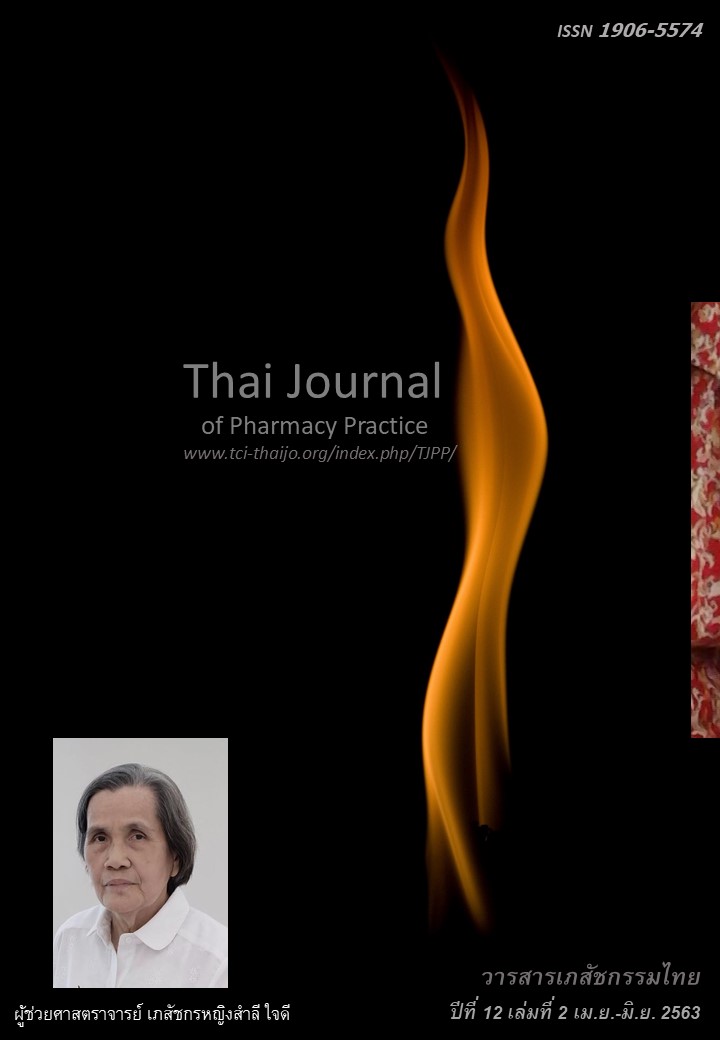การทบทวนการวัดผลลัพธ์การดำเนินงานของระบบสนับสนุนการใช้ยาต้านจุลชีพสมเหตุผล
Main Article Content
บทคัดย่อ
บทความนี้มีวัตถุประสงค์เพื่อทบทวนการวัดผลลัพธ์ด้านต่าง ๆ ของการดำเนินงานระบบสนับสนุนการใช้ยาต้านจุลชีพสมเหตุผล (Antimicrobial Stewardship Program: ASP) ได้แก่ ด้านการใช้ยาต้านจุลชีพ ด้านกระบวนการ ด้านคลินิก และด้านเศรษฐศาสตร์ การวัดผลลัพธ์เป็นขั้นตอนหนึ่งของ ASP เพื่อติดตามและรายงานผลการดำเนินงาน American College of Clinical Pharmacy (ACCP) ได้แนะนำให้วัดผล 3 ด้าน ได้แก่ ด้านการใช้ยาต้านจุลชีพ ด้านกระบวนการ และด้านผลลัพธ์อื่นที่เกี่ยวข้อง (ด้านคลินิกและด้านเศรษฐศาสตร์) ในแต่ละด้านของการวัดผลลัพธ์มีการกำหนดตัวชี้วัดเพื่อใช้รายงานผล ดังนี้ Days of Therapy (DOT) หรือ Defined Daily Dose (DDD) (ตัวชี้วัดด้านการใช้ยาต้านจุลชีพ) ความร่วมมือของแพทย์ต่อการใช้แนวทางการรักษาในเวชปฏิบัติ หรือระยะเวลาที่ใช้ยาต้านจุลชีพ (ตัวชี้วัดด้านกระบวนการ) อัตราการเสียชีวิตหรือระยะเวลาในการนอนโรงพยาบาล (ตัวชี้วัดด้านคลินิก) และค่าใช้จ่ายทางตรงเกี่ยวกับยาต้านจุลชีพหรือค่าใช้จ่ายในการนอนโรงพยาบาล (ตัวชี้วัดด้านเศรษฐศาสตร์) จากการทบทวนการศึกษาในต่างประเทศ พบว่า ASP ส่งผลอย่างชัดเจนต่อการลดปริมาณการบริโภคยาต้านจุลชีพ เพิ่มความร่วมมือของแพทย์ต่อการใช้แนวทางการรักษาในเวชปฏิบัติ ลดค่าใช้จ่ายทางตรงเกี่ยวกับยาต้านจุลชีพและค่าใช้จ่ายที่เกี่ยวข้องกับการนอนโรงพยาบาล ลดระยะเวลาในการรักษา และ ลดระยะเวลาในการนอนโรงพยาบาล อย่างไรก็ตาม การเปลี่ยนแปลงอัตราการเสียชีวิต ยังไม่สามารถสรุปได้อย่างชัดเจน จึงจำเป็นต้องมีการศึกษาเพิ่มเติมในอนาคต
Article Details
ผลการวิจัยและความคิดเห็นที่ปรากฏในบทความถือเป็นความคิดเห็นและอยู่ในความรับผิดชอบของผู้นิพนธ์ มิใช่ความเห็นหรือความรับผิดชอบของกองบรรณาธิการ หรือคณะเภสัชศาสตร์ มหาวิทยาลัยสงขลานครินทร์ ทั้งนี้ไม่รวมความผิดพลาดอันเกิดจากการพิมพ์ บทความที่ได้รับการเผยแพร่โดยวารสารเภสัชกรรมไทยถือเป็นสิทธิ์ของวารสารฯ
เอกสารอ้างอิง
2. Barlam TF, Cosgrove SE, Abbo LM, MacDougall C, Schuetz AN, Septimus EJ, et al. Implementing an antibiotic stewardship program: guidelines by the Infectious Diseases Society of America and the Society for Healthcare Epidemiology of America. Clin Infect Dis. 2016;62:e51-77.
3. Health Systems Research Institute, Coordination and Integration Committee on Antimicrobial Resistance. Thailand national strategic plan on antimicrobial resistance 2017-2021 [online]. 2017 [cited Nov 14, 2018]. Available from: kb.hsri.or.th/ dspace/bitstream/handle/11228/4807/he0143.pdf?sequence=3&isAllowed=y.
4. Society for Healthcare Epidemiology of America, Infectious Diseases Society of America, Pediatric Infectious Diseases Society. Policy statement on antimicrobial stewardship by the Society for Health care Epidemiology of America (SHEA), the Infectious Diseases Society of America (IDSA), and the Pediatric Infectious Diseases Society (PIDS). Infect Control Hosp Epidemiol. 2012; 33: 322-7.
5. Rattanaumpawan P. Antimicrobial stewardship in hopitals. Bangkok: Siriraj Academic Affairs; 2018.
6. Ananwattanakit M. Effects of antimicrobial steward ship program on appropriate antibiotic use [disserta tion]. Bangkok: Chulalongkorn University; 2014.
7. Centers for Disease Control and prevention. Core elements of hospital antibiotic stewardship programs [online]. 2014 [cited Aug 23, 2018]. Available from: www.cdc.gov/antibiotic-use/healthcare/pdfs/core-elements.pdf.
8. Stover KR. Metrics in stewardship. In: ACCP up dates in therapeutics® 2018: infectious diseases pharmacy preparatory review course 2018. p. 537-79.
9. WHO Collaborating Centre for Drug Statistics Methodology. Guidelines for ATC classification and DDD assignment 2019 [online]. 2019 [cited Apr 28, 2019]. Available from: www.whocc.no/filearchive/ publications/2019_guidelines_web.pdf.
10. WHO Collaborating Centre for Drug Statistics Methodology. ATC/DDD index 2019 [online]. 2019 [cited Apr 28, 2018]. Available from: www.whocc.no /atc_ddd_index/.
11. World Health Organization. WHO methodology for a global programme on surveillance of antimicrobial consumption version 1.0 [online]. n.d. [cited Oct 19, 2018]. Available from: www.who.int/medicines/area s/rational_use/WHO_AMCsurveillance_1.0.pdf?ua=1.
12. Polk RE, Fox C, Mahoney A, Letcavage J, MacDougall C. Measurement of adult antibacterial drug use in 130 US hospitals: comparison of Defined Daily Dose and Days of Therapy. Clin Infect Dis. 2007; 44:664-70.
13. Dik JW, Hendrix R, Poelman R, Niesters HG, Postma MJ, Sinha B, et al. Measuring the impact of antimicrobial stewardship programs. Expert Rev Anti Infect Ther. 2016; 14: 569-75.
14. Karanika S, Paudel S, Grigoras C, Kalbasi A, Mylonakis E. Systematic review and meta-analysis of clinical and economic outcomes from the implementation of hospital-based antimicrobial stewardship programs. Antimicrob Agents Chemo ther. 2016; 60: 4840-52.
15. Davey P, Marwick CA, Scott CL, Charani E, McNeil K, Brown E, et al. Interventions to improve antibiotic prescribing practices for hospital inpatients. Cochrane Database Syst Rev. 2017;2:CD003543.
16. Honda H, Ohmagari N, Tokuda Y, Mattar C, Warren DK. Antimicrobial stewardship in inpatient settings in the Asia Pacific region: a systematic review and meta-analysis. Clin Infect Dis. 2017; 64: S119-S26.
17. Pugh R, Grant C, Cooke RP, Dempsey G. Short-course versus prolonged-course antibiotic therapy for hospital-acquired pneumonia in critically ill adults. Cochrane Database Syst Rev. 2015:CD007577.
18. Eliakim-Raz N, Yahav D, Paul M, Leibovici L. Duration of antibiotic treatment for acute pyelonephritis and septic urinary tract infection - 7 days or less versus longer treatment: systematic review and meta-analysis of randomized controlled trials. J Antimicrob Chemother. 2013; 68: 2183-91.
19. Royer S, DeMerle KM, Dickson RP, Prescott HC. Shorter versus longer courses of antibiotics for infection in hospitalized patients: a systematic review and meta-analysis. J Hosp Med. 2018; 13: 336-42.
20. Spellberg B. The new antibiotic mantra-"shorter is better". JAMA Intern Med. 2016; 176: 1254-5.
21. Wagner B, Filice GA, Drekonja D, Greer N, MacDonald R, Rutks I, et al. Antimicrobial steward ship programs in inpatient hospital settings: a systematic review. Infect Control Hosp Epidemiol. 2014; 35: 1209-28.
22. Schuts EC, Hulscher M, Mouton JW, Verduin CM, Stuart J, Overdiek H, et al. Current evidence on hospital antimicrobial stewardship objectives: a systematic review and meta-analysis. Lancet Infect Dis. 2016; 16: 847-56.
23. Lee CF, Cowling BJ, Feng S, Aso H, Wu P, Fukuda K, et al. Impact of antibiotic stewardship program mes in asia: a systematic review and meta-analysis. J Antimicrob Chemother. 2018; 73: 844-51.


